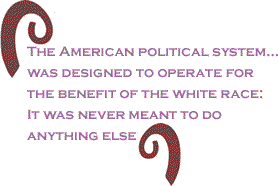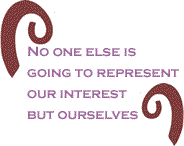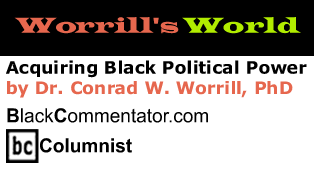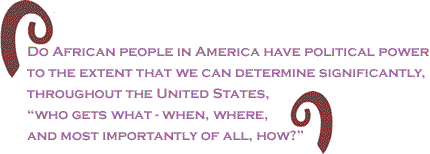On November 19-23,
2008, I participated in the State of the Black World Conference II,
sponsored by the Institute of the Black World 21st Century, and
led by Dr. Ron Daniels. The conference was a great gathering of
scholar/activists from throughout the United States who
have made significant contributions to the Black Liberation Movement.
A host of young scholar/activists were also in attendance that created
much needed intergenerational dialogue.
There
is no question that the election of Senator Barack Obama to the
Presidency of the United States of America is a giant achievement
in the history of African people in America. However, the general consensus of the conference was that this achievement
should not curtail the movement to continue to struggle for Black
Political Power in America
just as all other ethnic groups have done and continue to do.

Specifically, I participated, along with Professor Robert
“Bob” Starks, Zahi Baruti,
Councilmember JoAnn Watson, Councilman Charles Barron, and Representative
Constance Johnson in a workshop on “Revitalizing Progressive Black
Politics.” I was able to present the following in this workshop:
The
question that still faces the African Community in America is what are the best methods for us to
achieve Black Political Power. I often remind readers of this column
that “politics is the science of who gets what - when, where, and most important of all,
how.”
Since
1996, when Kwame Ture (formerly known
as Stokely Carmichael) made his pronouncement that what African
people in America
needed to strive for was Black Power,
the dynamics of Black politics in America
shifted drastically.
 It
has been over forty years since Kwame made this call for Black Power
in June of 1966. Today, there are more
than 11,000 Black elected officials in the United States. That includes more than forty congressmen
and women, a U. S. Senator,
more than six hundred Black mayors, a host of state senators and
state representatives, and numerous local elected officials in a variety of elected and appointed
political positions. Most of these elected and appointed officials
are Democrats. It
has been over forty years since Kwame made this call for Black Power
in June of 1966. Today, there are more
than 11,000 Black elected officials in the United States. That includes more than forty congressmen
and women, a U. S. Senator,
more than six hundred Black mayors, a host of state senators and
state representatives, and numerous local elected officials in a variety of elected and appointed
political positions. Most of these elected and appointed officials
are Democrats.
With
this number of elected and appointed officials,
the question must be raised in the 21st Century,
do African people in America have political power to the extent
that we can determine significantly, throughout
the United States, “who gets what - when, where, and most importantly of all,
how?” The answer to this question is and obvious “NO!”

The
call for Black Power in 1966 led to the organizing of the first
Black Power Conference that was convened on Saturday,
September 3, 1966 at the Rayburn
House Office Building
in Washington, D.C. The session was called by the late, great, Congressman Adam Clayton Powell and
was generally referred to as a National Planning Committee.
 As
a result of the first Black Power Conference,
several subsequent Black Power Conferences were held in 1967 in
Newark, New Jersey, 1968 in Philadelphia, and the Fourth International Black Power Conference was held in Bermuda
in 1969. As
a result of the first Black Power Conference,
several subsequent Black Power Conferences were held in 1967 in
Newark, New Jersey, 1968 in Philadelphia, and the Fourth International Black Power Conference was held in Bermuda
in 1969.
As
an outgrowth of the Black Power Conferences,
the Congress of African People Conference was called in the summer
of 1970 in Atlanta, Georgia. More than 3,000 people of African ancestry
attended this meeting. It was at this meeting that a resolution
was adopted that a political structure be established to create
a National Black Political Convention.
This
historic First National Black Political Convention took place in
Gary, Indiana in March of 1972. More than 8,000 Black people from every state
participated in this momentous gathering.
The
follow-up from this convention “created a structure called the National
Black Political Assembly which was to continue permanently after
the convention.”  Additionally,
it was the aim of the Assembly “to develop a new Black Politics
and organize the National Black Political Agenda” that was established
at the convention. Additionally,
it was the aim of the Assembly “to develop a new Black Politics
and organize the National Black Political Agenda” that was established
at the convention.
The
introduction of the 1972 Gary National Black Political Convention
agenda stated some profound truths that we should be reminded of
as we prepare for the upcoming political season.
First, it stated that “Here at Gary, let us never
forget that while the times and the names and the parties have continually
changes, one truth has faced us insistently,
never changing: Both parties have betrayed us whenever their interest
conflicted with ours (which was most of the time),
and whenever our forces were unorganized and dependent, quiescent
and complaint.”
Continuing, this part of the introduction explained - “Nor should this be surprising,
for by now we must know that the American political system,
like all other white institutions in America, was designed to operate for the benefit of the white race: It was
never meant to do anything else.”

Second, in this introduction, another set of truths
were revealed, “So when we turn to a Black
Agenda for the seventies, we move in the
truth of history, in the reality of the
moment. We move recognizing that no one else is going to represent
our interest but ourselves.  The
society we seek cannot come unless Black people organize to advance
its coming. We lift up a Black Agenda recognizing that white
America
moves towards the abyss created by its own racist arrogance, misplaced priorities, rampant materialism,
and ethical bankruptcy.” The
society we seek cannot come unless Black people organize to advance
its coming. We lift up a Black Agenda recognizing that white
America
moves towards the abyss created by its own racist arrogance, misplaced priorities, rampant materialism,
and ethical bankruptcy.”
It
is clear that we should reexamine the 1972 Gary Declaration as we
interact with the new Presidential Regime of Barack Obama and our
continued quest to achieve genuine Black Political Power.

BlackCommentator.com Columnist, Conrad W. Worrill, PhD, is the National
Chairman of the National Black United Front (NBUF). Click here
to contact Dr. Worrill. |







































 It
has been over forty years since Kwame made this call for Black Power
in June of 1966. Today
It
has been over forty years since Kwame made this call for Black Power
in June of 1966. Today Additionally
Additionally






